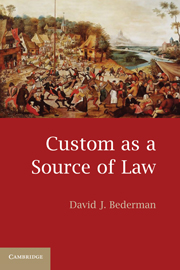1 - Anthropology
Custom in Preliterate Societies
Published online by Cambridge University Press: 05 June 2012
Summary
All law begins with custom. Anthropologists know this, and see the role of custom in law as part of a larger phenomenon of the law of primitive peoples, or even more simply “primitive law.” While that label for this subject is admittedly preferable to older references to the “law of savages,” it is not the terminology adopted here because of the value judgments and moral freighting of distinguishing between human societies that are “primitive” and “modern.” For the purposes of considering this topic, it seems unnecessary to denominate any jurisprudence as “primitive,” and it also deflects focus from the real attributes of these societies: the nonliterate or preliterate character of their material and legal culture. This is not just “political correctness”; it is a search for an accurate and neutral term-of-art. So, to the extent that anthropological and ethnographic scholarship has informed our understanding of custom’s role in law, it seems best to describe this subject as part of the law of preliterate societies. This is so, irrespective of whether such groups ultimately make the transition and reach a level of literate legal culture, are nomadic or sedentary in character, or are tribal or semipermanent in structure.
Presumably all law in preliterate culture is custom. But, as a matter of ethnographic study, that may not always be the case, and it leads to a central quandary explored in this volume: Is custom always unwritten or unenacted law? A related question to be addressed in this chapter is whether customary norms of behavior should be a more important source of law in preliterate societies, as opposed to those with a vibrant, literate legal culture.
- Type
- Chapter
- Information
- Custom as a Source of Law , pp. 3 - 15Publisher: Cambridge University PressPrint publication year: 2010
- 2
- Cited by

